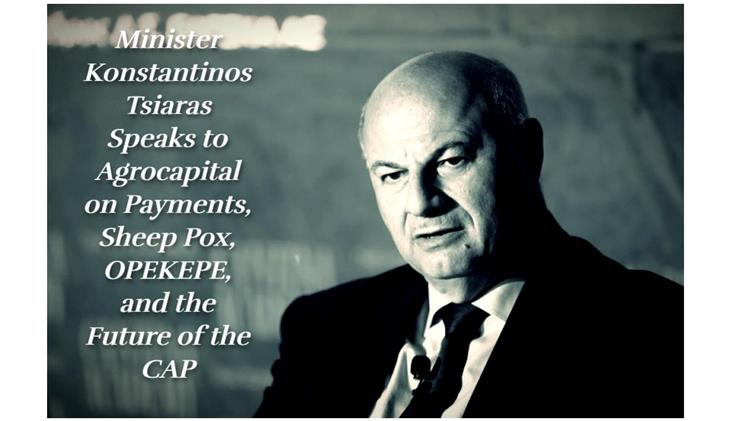Agro World News: Exclusive interview of agriculture minister K. Tsiaras speaks to Agrocapital on payments, sheep pox, OPEKEPE, and the future of the CAP

The Minister of Rural Development and Food, Konstantinos Tsiaras, gave an interview to Georgios Bacolas for Agrocapital, presenting the government’s plan in response to the challenges faced by the primary sector. Against the backdrop of the spread of sheep pox, the pressures from high production costs, and delays in payments, the minister explains how the State is attempting to balance crisis management with ensuring the survival of livestock farming.
The discussion also extended to the future of the Common Agricultural Policy, with Mr. Tsiaras pointing out the need for more fairness and less bureaucracy, as well as the utilization of AKIS, the new system that promises to bring research closer to the everyday life of farmers. In a calm and well-documented statement, the minister emphasizes that support for rural areas is not a temporary choice but a strategic objective, with measures that combine addressing immediate needs with designing a more resilient production model.
The interview follows.
— Minister, the cases of sheep pox in small ruminants have left behind a chain of consequences, from the loss of livestock to unsold feed. What support plan is the Ministry working on to cover the extent of this damage, both for those directly affected and those indirectly impacted? Is there a risk of lockdown?
First of all, I want to make it clear that no one is left out of the fight against sheep pox. The State, Regions, and farmers must and are obliged to contribute to the fight for the eradication of a — by common admission — difficult disease, which of course does not affect humans but only sheep and goats.
As far as the initiatives we have taken are concerned
From the first day of the appearance of sheep pox, on August 20, 2024, we implemented the measures provided for in the relevant European regulation (687/2020). And while before Easter we had managed to bring the cases down to zero for two weeks, immediately afterwards we had a resurgence. We continued in the same direction, but either due to fatigue from the long period of implementing the measures, or due to relaxation by local authorities in enforcing them, we reached the point where additional measures were needed. At a meeting held on Monday with the Regional Governors, we unanimously — and I emphasize this — decided, before moving to a lockdown, to activate an additional comprehensive ten-day operational plan. The plan provides for the creation of disinfection stations at key points of each regional unit affected by sheep pox. We have mobilized all veterinarians of the Ministry of Rural Development and Food and its supervised bodies, while a strict biosecurity framework is being applied. We also requested that the Regions proceed without any delay to the faithful implementation of all measures provided for by the National Emergency Plan and the European framework. Greece is fighting not only to contain but to eradicate the disease, with absolute respect for the effort and anxiety of livestock farmers.
— But it is not only about crisis management. There is also the question of the survival of livestock farming…
Of course, we are not only focused on managing the health crisis. We have designed a broader support package, which will cover both livestock farmers who lost animals and those indirectly affected. Greece, after all, is the country with the highest compensations in the European Union. We reach 250 euros per animal, while in the rest of the EU the compensation is 95 euros per animal. This, however, is not accidental. It is our political choice to provide tangible support to those who are on the frontline of production and the economic life of the countryside.
The message is clear: we will not leave anyone alone. The government, in cooperation with the European Commission, with the Regions, and with all stakeholders, has one and only goal: to prevent the spread of the disease and to keep Greek livestock farming alive, which is a crucial part of the Greek economy and of the food security of our country.
That is why discipline in the implementation of measures is a condition for survival. If we all comply with the measures and move with discipline, we will avoid the worst-case scenario. Because a “lockdown” in the livestock sector is the last resort — and we will do everything in our power so that we never have to get there.
— Minister, given the mass culling of herds due to sheep pox, is there a risk of serious shortages in small ruminants and of further increases in the prices of meat and milk?
I understand the concerns, but the situation does not justify fears of major shortages. To date, the culls due to sheep pox amount to only 1.63% of the total livestock declared in the country. To be precise, at the end of 2024 we had about 17 million small ruminants, and during the epidemic 262,854 animals had to be culled. This percentage, while certainly not negligible for the families affected, does not threaten supply at the national level.
Furthermore, as regards milk, when strict biosecurity protocols are followed, no problem arises with distribution. Milk collection is permitted, as the collection trucks do not enter the farm but collect the product through safe procedures. Therefore, there is no risk of disrupting the supply chain.
In conclusion, the government is monitoring the market and prices daily. We remain alert to prevent any distortions, but the reality shows that there is no reason to panic over meat or milk. On the contrary, with strict adherence to biosecurity measures and the strict controls we are implementing, we safeguard both animal health and market stability.
— In public debate, some advocate vaccination as a solution for sheep pox, instead of mass culling. Is the Ministry seriously considering this option, or is it committed exclusively to the eradication strategy through culling?
I listen with respect to those who propose vaccination. The truth, however, is that vaccination is not the method of choice for eradicating sheep pox and it presents serious problems.
First, there is no approved vaccine in the EU, and those available outside Europe lack sufficiently documented effectiveness against all strains.
Second, the live attenuated virus carries the risk of pathogenic resurgence and transmission to healthy animals.
Third, there is no differentiation test (DIVA). Simply put, after vaccination it is not easy to tell whether an animal has antibodies because it was infected or because it was vaccinated. This imposes severe restrictions on the movement of animals within the country and creates two different “regimes” with different rules.
Fourth, vaccination would hurt exports: many third countries do not accept products from areas with outbreaks or vaccination; they may block health certificates for live animals, meat, milk, dairy, or wool. The country risks losing for years the “sheep pox free” status, which is not easily restored — we saw this with lumpy skin disease.
Fifth, there are not enough doses available to achieve the necessary coverage (~75%). Without this, young and vulnerable animals are particularly at risk, as the virus can survive for months in the environment.
Sixth, even if we vaccinate, culling in infected herds, disinfection, movement restrictions, sampling, and laboratory tests do not stop: vaccination does not replace the eradication strategy — it adds to it.
In any case, we must also protect the credibility of Greek products. The experience of other countries shows that where vaccination was chosen, rapid elimination of the disease did not occur, and for years the commercial image and export flows were affected. Therefore, we have well-founded doubts as to whether vaccination should be initiated without the necessary scientific substantiation.
With these facts in mind, our decision is responsible and clear: we continue along the line of eradication, protecting livestock farmers and the country’s economy. We remain in open dialogue with the European Commission and the scientific community, and if in the future a safe, effective, and available vaccine emerges with clear funding and without blowing up animal movement and exports, we will consider it. But we will not take a step today that poses more risks than benefits.
— The increased production cost remains the greatest headache for farmers. On the horizon we see energy, feed, and farm inputs burdening the final product. Are you planning new interventions that could provide relief for the primary sector?
The battle with production costs is daily. And as you know, production costs are affected by many internal and international factors. We have already activated tools to reduce energy costs and rationalize feed, but an extra step is needed. We are moving forward with new interventions that will provide substantial relief, with targeted support, investments in Renewable Energy Sources, and support for cooperative schemes that can achieve better prices for farm inputs. It is not enough to “put out fires”; we must create a resilient production model that will allow farmers to produce at sustainable costs and compete fairly in the markets.
But this new production model, based on cooperation, must be embraced by everyone. First and foremost, by the farmers themselves. Only united can we face the challenges of a changing present and an uncertain, due to international conditions, future.
— Delays in payments have become a permanent source of insecurity for farmers. Can you give us a clear timetable until the end of the year? And how will you ensure that no pending payment remains to the beneficiaries?
The delays in payments are understandable and directly linked to the checks being carried out by OPEKEPE in cooperation with the Financial Police and the Independent Authority for Public Revenue (AADE). Let me remind you that for more than two months both services were drawing data from OPEKEPE databases in order to perform proper cross-checks. In the coming days, the overdue payments will be made. As far as the broader issue you raise, I want to be absolutely clear: our goal is to complete the payment of the basic aid by October 30.
At the same time, OPEKEPE’s Action Plan, which was extended until the spring, gives us time to close all pending issues and ensure that no payment will be lost or unjustifiably delayed. The real cross-checks being carried out for the first time restore the system’s credibility and ensure that every euro goes to those who deserve it.
— The Common Agricultural Policy is faced with new challenges, from climate transition to the pressure on farmers’ incomes. Do you believe that the current framework meets the needs of the times, or does it need adjustment? And if so, in what direction should it move to support farmers more effectively in the coming years?
The current CAP has positive elements, but it is not a panacea. The climate crisis, extreme weather conditions, rising production costs, and international instability require a more flexible and fairer CAP. With less bureaucracy and more fairness. We are advocating for a CAP that places greater emphasis on income support for farmers, that rewards biosecurity practices and investments in the green transition, but does not exclude those who actually produce. And support must be linked to production only. We cannot talk about sustainable agriculture if the farmer cannot make a living from his field. The next day requires adjustment, with the farmer at the center and not trapped in endless bureaucracy.
— AKIS is presented as a new tool that aspires to connect research with production. In practice, how will it change the daily life of the Greek farmer? And what means will he have at his disposal so that innovation does not remain on paper, but translates into real benefit for his farm?
AKIS is not a theoretical scheme; it is the means to bring research and innovation closer to the farmer. Through the network of advisors and the use of digital tools, the farmer will have practical solutions: how to reduce water costs, how to protect crops from new diseases, how to increase yield without increasing expenses. What used to take years to reach the field will now reach immediately. AKIS is the channel that will make innovation part of daily life, so that the farmer sees the benefit in his wallet and in the quality of his product.
The statement of Minister Konstantinos Tsiaras reveals the intention of a policy that is not limited to managing emergencies but seeks to lay the foundations for a more sustainable and resilient agriculture. The challenges are many and complex, from animal diseases to rising production costs, yet the common goal remains: to ensure that the Greek countryside continues to produce, to renew itself, and to support society.
If the initiatives materialize, then this interview may be recorded not only as a substantial response to today’s problems but also as a starting point for a different orientation of the agricultural sector.
By Giorgos Bacolas, for Agrocapital
Ακολουθήστε το Agrocapital.gr στο Google News και μάθετε πρώτοι τις ειδήσεις
Οι απόψεις που εκφράζονται στα σχόλια των άρθρων δεν απηχούν κατ’ ανάγκη τις απόψεις της ιστοσελίδας μας, το οποίο ως εκ τούτου δεν φέρει καμία ευθύνη. Για τα άρθρα που αναδημοσιεύονται εδώ με πηγή, ουδεμία ευθύνη εκ του νόμου φέρουμε καθώς απηχούν αποκλειστικά τις απόψεις των συντακτών τους και δεν δεσμεύουν καθ’ οιονδήποτε τρόπο την ιστοσελίδα.




